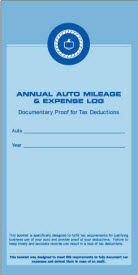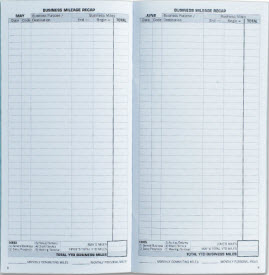
Mileage Record Keeping Requirements
|
To deduct transportation expenses, you must be able to prove or substantiate the expenses. The IRS will not let you deduct amounts that you estimate, so it is very important to keep adequate records and receipts to prove your exact expenses. Generally, the IRS wants a written record for it to be considered adequate - because written evidence is more reliable. Computer records are considered adequate, as well as an account book, diary, log, statement of expense, trip sheets, or similar record. Supporting documetation should be kept as additional evidence. Timely kept records have more value than a statement prepared later. Mileage records should generally be kept for 3 years from the date the tax return containing the mileage expenses is filed. Your mileage log must contain the following information.
Reconstructing Mileage Log RecordsIf you have been audited and did not keep a mileage log, all is not lost. If you have supporting documentation like dated receipts, bank deposit slips, etc., you can use a spreadsheet to build a log containing all of the information above. You will need to know the mileage for each trip to the bank or other destination, as you add each line to the log. The receipts are documented proof that you made each trip. The IRS will also let you use a "sampling" method, where you keep track of your mileage for part of the year, and extend those amounts out for the entire year. If you do this though, you will have to demonstrate with other evidence that your sampling period is representative of the use throughout the year. A specific example that the IRS sites is where you would use your car to visit clients or suppliers, etc., and you would keep accurate records during the first week of each month that show that a certain percentage of your mileage is business mileage. Your weekly records would then be representative of the use of your car for each month and sufficient evidence to support the percentage of business use for the entire year. You would obviously still have to keep your annual starting and ending mileage though. Getting your oil changed on December 31st is a great way to document this, since most firms stamp the odometer reading on your invoice, and you would generally keep that receipt. The IRS will also let you reconstruct records if your records have been destroyed due to fire, flood, or other casualty.
Terms of use /
Sources:
1
2
3
|
Copyright © 2006-2016 http://www.mileage-log.com and Spectrum Research, Inc., All Rights Reserved.

